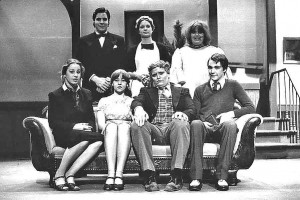When theater becomes special

The cast of The Man Who Came To Dinner that the columnist directed. (Contributed Photo)
Those who are fortunate enough to work in the theater usually have some good tales to tell. I am not talking about amateur plays, but professionals, who often go on tour, or have a long run somewhere. This also applies to Summer Stock productions, where a hardy band of talented people put on a variety of plays and musicals.
What makes these experiences special is that everybody becomes friends, hang out together after a performance, and generally have a wonderful time.
I’ve had the pleasure to work with a few theater companies over the years. The first one was in Killarney, Ireland. I “mucked in” with the other actors—we were all in our 20s— and we had a fantastic time because everyone got along (for the most part).
Early in the morning we’d gather in front of the stage, and the “tea boy” (Julian Erskine, who later created “Riverdance”) would bring us cups of hot tea to start the day.
After the tea, we’d build the set for the evening performance. Everybody pitched in and dragged the “flats” around. (A flat is a piece of scenery, about 10 feet high and three feet wide. They are then lashed together and screwed into the floor, so they’ll remain stable.
If there was enough time after a show, and everyone had some energy, we’d “strike” the set and pile the flats at the back. A young helper (there are always a few) would sweep the stage and tidy up.
I think that the best part was all of us going to a pub after a show. Our “local” was called “The Flesk”—named after the River Flesk, which ran near Killarney. Over pints of Guinness, Harp, or Double Diamond (my favorite) we would tell stories of past productions and these were always great fun. They were fun because all of the young actors had been around in various companies or productions and funny things always happened.
A tale was told about a theater company that would tour the high schools and perform Shakespeare. This company was “in rep” which meant that sometimes they did Hamlet, another time they’d perform Romeo and Juliet. Then, after the performance, the actors and director would come out to the stage, sit on the apron, and answer questions from the young audience.
One day, after a performance of Hamlet, and many questions had been asked and answered, a young girl raised her hand. The director nodded to her. The girl asked, “Do you think that Hamlet and Ophelia ever had intimate relations?” The director thought for a moment and then said, “Well, in the Chicago company they did.”
A tale is also told about the great John Barrymore, who continued to play Hamlet, even though he was nearly 60 years old. He had toured with Hamlet for decades, and was held in high esteem.
After a performance at Yale, a cocky college student asked Mr. Barrymore, “Aren’t you a little too old to play the role of Hamlet?” Barrymore stood up and scowled at the audience.
“I have been playing Hamlet for more than 40 years; many times here, at Yale. Now you need to be quiet, because for all you know, I might be your father.”
Sometimes actors would play pranks on each other during a performance. They were not appreciated, but often an actor would get bored playing the same role night after night and wanted to have a little fun.
You may not be familiar with the term, “to upstage” another actor. This means that an actor is doing something to draw attention to him or her, and draw focus away from the other actors and the scene.
One aging actress was to sit on an upstage sofa and smoke a cigarette while her fellow actor gave a long monologue, standing downstage. What the woman did was to take a long hat-pin and put it in the cigarette. As she smoked, the ash got longer and longer. However, because of the pin, the ash didn’t fall off—and the audience was riveted. The downstage actor sensed something odd, and kept looking back to see what was happening, but he just saw the actress with her cigarette.
When the cigarette was nearly finished and the ash was three inches long, she carefully set it into an ashtray. The audience breathed a collective sigh of relief. The actor wasn’t pleased, but it was a very clever trick.
There’s no business like show business
The wonderful Groucho Marx once relayed this story during his one-man show at Carnegie Hall in 1972.
“I saw an ad in The Morning World. It was from a theatrical outfit and the ad said, simply, “Boy Wanted.” So I ran all the way down from 93rd Street to 46th Street, ran up seven flights of stairs and knocked on the door.
“Eventually a woman opened the door. She was quite a sight: she had bleached-blonde hair, and wore a beige slip with stains on it. She smoked a cigarette, her lipstick was smeared and she smelled like cheap booze. And, when I saw this woman, I knew that this was the profession that I wanted to enter.”
I once directed a production of “The Man Who Came To Dinner.” It was put on by the Milford (New Hampshire) High School Junior Class, and it was one of the best productions I’ve ever been associated with. But, before we got started, it needed an angle, and I found it.
The play, written by George S. Kaufmann and Moss Hart, was first produced in 1939: that was the hook. I had the actors wear 1930s clothes; the boys all got haircuts and the girls had their hair bobbed. So that was the way to go: back in time, to 1939. I found some old music from the period, and—and the ending tableau (they actors all freeze as the curtain closes) was framed by the music of Ben Bernie, a song called “Au Revoir.” “Until the next time, when—possibly you will all tune in again. Keep the old maestro always in your schemes. Yowzah yowzah yowzah.”
If you’d care to hear the song, search YouTube for “Ben Bernie Au Revoir.” It’s just swell and sentimental.
The audience had been enthralled—even before the play began: the programs looked old-fashioned, and we had antique cars in the bus loop out front. The local fire department contributed some gigantic searchlights, so it looked like a 1930’s Hollywood premier at the high school.
I did quite a few other shows, but this one remains a favorite, because the students “got it” and pitched in to make it 1939 all the way.
Irving Berlin had it right: There’s no business like show business. (Russ Mason)
Russ Mason, M.S., wrote for a medical journal, “Alternative & Complementary Therapies,” for eight years. He interviewed dozens of doctors who had much to share about unconventional treatment options. These included Tibetan medicine, Chinese medicine, botanicals, and treating stroke victims with hyperbaric oxygen.



























